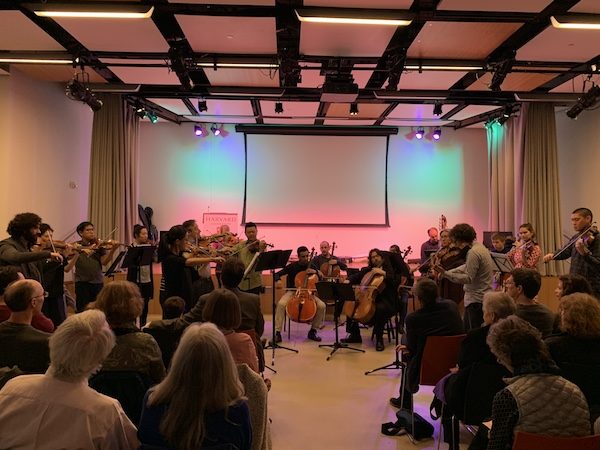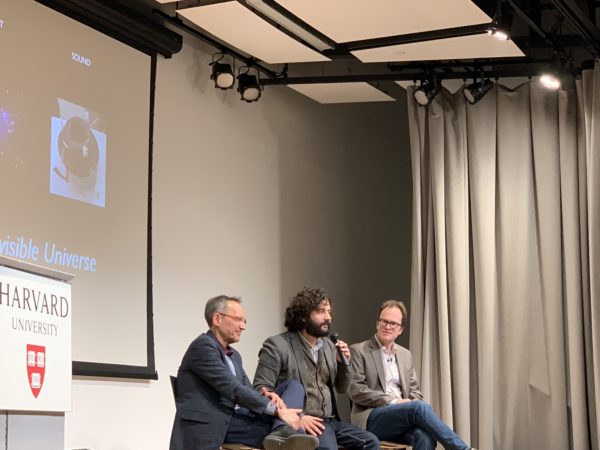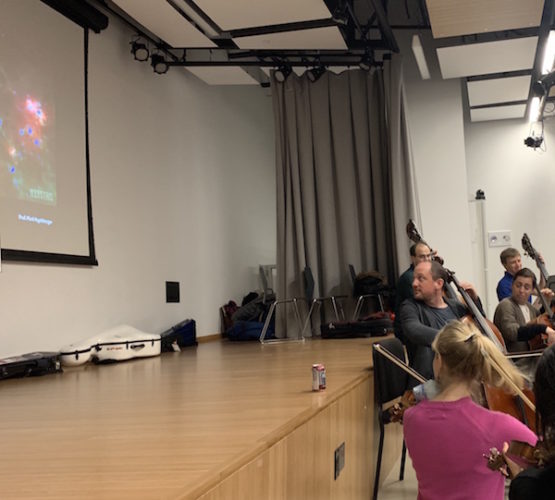Music Preview: Music as Metaphor — A Far Cry, a Physicist, and a Composer Reflect on “Gravity”
By Eric Fishman

A Far Cry rehearses Osvaldo Golijov’s Tenebrae. Photo: Eric Fishman.
During chamber orchestra A Far Cry’s open rehearsal at the Harvard Ed Portal Wednesday night, an audience member asked composer Osvaldo Golijov about black holes. How would Golijov portray, in music, the newly released Event Horizon Telescope photo of the cosmic abyss? Golijov paused. “I know how I would do it. But it’s just a metaphor, right? I would try to make a sound metaphor of things being sucked into it.”
When we use metaphors, we are rarely aware of the word’s origin: the Greek metaphora — to carry over. Viewed from this perspective, metaphors are attempts to move meaning from one realm to another: from my mind to yours, from long ago to the present day, from far away to close at hand. Golijov, A Far Cry, and MIT physicist Jesse Thaler all grappled with metaphors at different moments during the event, as they worked through the question: how can we conceptualize ourselves within the vastness of the universe?
A Far Cry began with a short rehearsal, working through several passages in Golijov’s 2002 chamber work Tenebrae. Golijov, a Jewish-Argentinean composer now living in the Boston area, gave a brief introduction to the piece, explaining that he composed it to try and reconcile two contradictory experiences. He visited Jerusalem in September 2000, just before the beginning of the violence of the Second Intifada. The next week, he was back in New York, watching the conflict from afar, and went with his son to a planetarium show, where they watched the Earth recede into a small blue dot.
Tenebrae seethes with movement, but movement that is concealed under long orbits of melody. Many of these polyphonic tensions quote material from Couperin’s three vocal settings Lessons of Darkness. “Jerusalem … how deserted lies the city, once so full of people! With violence she was put to the ground,” cries the Lamentations of Jeremiah, the text for Couperin’s piece. But in Tenebrae, the destruction soon recedes into blissful harmony. The “sound metaphor” of this piece seems to ask: how can something as fluctuating and violent as the Earth can look so serene from above? An existential question of scale: all noises fall silent when listened to from far enough away.
A Far Cry is a pleasure to watch rehearse. Metaphors made frequent appearances as the musicians grappled with different passages, with various members of the conductorless 17-musician group explaining musical nuances to each other.
Physicist Jesse Thaler took the stage to explain his research into dark matter. Questions of scale and metaphor predominated here as well. Thaler zoomed us out from the Earth, step by step, to the edges of the observable universe. Distances were measured not in light years but in “light Adrian lifetimes” – a unit Thaler invented based on the age of his young son. Whereas for Golijov, humanity recedes as we move away from the Earth, for Thaler the only way to explain the incomprehensibly vast expanses of space was to utilize an intimate measurement drawn from his family.

Physicist Jesse Thaler (right) and composer Oswaldo Golijov (left) talk with violinist Alex Fortes. Photo: Eric Fishman.
At the beginning of the concert, violinist Alex Fortes remarked that the evening’s concept was “to see the way things much larger than humanity come down to Earth.” Hence, the title “gravity.” But at times the event seemed to ask the inverse question: what happens to humanity when our minds travel out from the Earth? Even when we imagine clusters of galaxies, we cannot fully comprehend them without carrying over something of ourselves. But these attempts at metaphora are undeniably beautiful – moments when the vastness of our own lives interlaces with the immensity of space.
As Thaler began his talk, he said he was struck by the beginning of Tenebrae. “This passage sounds, to me, like the beginning of the universe, something we think of as being loud — but it was actually very, very quiet.” And he asked the orchestra to play the intimate opening again, as he projected a simulation of the Big Bang on the screen behind the stage. The musicians turned. The music swelled as the early universe spun …
A Far Cry plays “Gravity” at several events this weekend: Jordan Hall on April 12, Merrimack College in North Andover on April 13, St. John’s Episcopal Church in Jamaica Plain on April 14, and Yale University on April 16. The full program also includes Arvo Pärt’s “Silouan’s Song,” Iannis Xenakis’ “Auoura,” Aaroron Jay Kernis’ “Musica Celestis,” and Bartók’s “Divertimento for String Orchestra.”

Photo: Eric Fishman.
Eric Fishman is an elementary school teacher, literary translator, and cellist. You can find out more about his work at www.ericjpfishman.com.

I was at the event. This is an extraordinary job of capturing it in words. Thank you!
Bob Frank